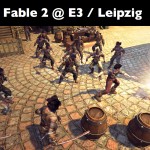

Major Minor's Majestic March
At the dawn of the music game genre,
Parappa the Rapper
set standards for original art style and gameplay that today’s
Guitar Hero
cohort has yet to match. Here was a game that valued your creativity, awarding you points for not just mastering rhythmic patterns, but stringing them together in novel flows.
Parappa took the feature that make arcade games so attractive, this remixing of set patterns, and married it to its natural partner, music.
The result was no less jazz than hip-hop, and by comparison today’s music games are Simon Says with plastic guitars. Music was meant to be made, not recited, after all. Rock Band lets you pretend to make music; Parappa pointed the way to game consoles as musical instruments. If anyone was to offer an alternative to the narrowing of the music game genre into karaoke with points, it would be the original Parappa team – developer Masaya Matsuura, artist Rodney Greenblatt, and studio NanaOn-Sha, with the long-awaited spiritual sequel Major Minor’s Majestic March
lets you pretend to make music; Parappa pointed the way to game consoles as musical instruments. If anyone was to offer an alternative to the narrowing of the music game genre into karaoke with points, it would be the original Parappa team – developer Masaya Matsuura, artist Rodney Greenblatt, and studio NanaOn-Sha, with the long-awaited spiritual sequel Major Minor’s Majestic March .
.
Sadly, while MMMM retains the hand-drawn charm and nutty characters of Parappa, its gameplay goes in entirely the opposite direction, amounting to little more than keeping the beat with a Wiimote. Gone is the creative license to mete out freestyle flows; instead you’re reduced to a human metronome.
Even that small premise might offer some dose of fun – kids, after all, seem to have an innate ability to rock a hot beat. But MMMM‘s rigid interface sucks the soul out of the rhythm. Sure, not everyone daydreams of being a drum major, but those who do probably don’t imagine themselves just pumping their fist up and down (a gesture uncomfortably in an unfortunate similar to an obsene gesture). And even such an activity as robotic as this might still offer a bit of amusement if it didn’t also demand such precision. Deviate from an exact up-down path and your band members split like groupies in a drug bust.
Like their peers in this generation, the creators of MMMM have lost the spirit of improvisation. (Wii Music lets you re-arrange public domain tunes, but the activity isn’t very natural, nor much of a game). Rock Band drum solos are about all you’ll find these days in terms of freestyle play in music games.
lets you re-arrange public domain tunes, but the activity isn’t very natural, nor much of a game). Rock Band drum solos are about all you’ll find these days in terms of freestyle play in music games.
“Flow” – a state of selfless, almost meditative immersion – describes the most absorbing aspect of game-playing and music-making alike. Guitar Hero and Rock Band made this connection so successfuly that they have changed pop culture itself. But what of the pleasures of musical creativity? A few months ago I watched the Princeton Laptop Orchestra performing with synthesizers controlled by a modified joystick (a “joyful noise” indeed!). It didn’t sound like jazz, nor did it look like an arcade game, but it shared the improvisational qualities of both. In so doing, PLOP inherits from Parappa the possibility that game hardware can function as musical instruments. Sadly, the direct descendant of Parappa instead illustrates why, in games as much as in music, it don’t mean a thing if it ain’t got that swing.
 PBS has launched a new film,
PBS has launched a new film, 


 It featured minimal graphics, no sound effects, and deeply flawed gameplay. Yet one of the most important game titles of 2008 was played by thousands and helped change the face of American politics. I’m writing about
It featured minimal graphics, no sound effects, and deeply flawed gameplay. Yet one of the most important game titles of 2008 was played by thousands and helped change the face of American politics. I’m writing about 


